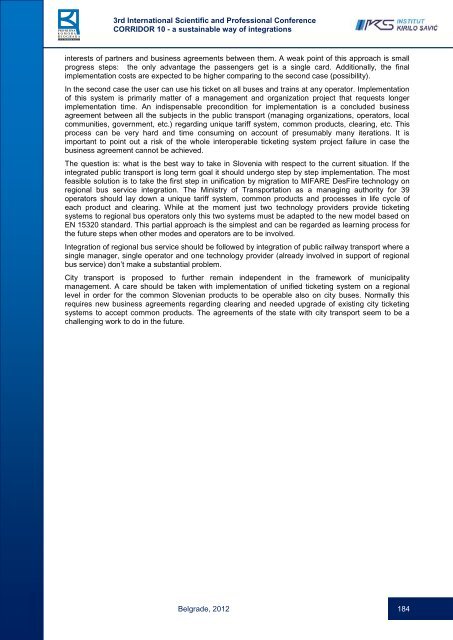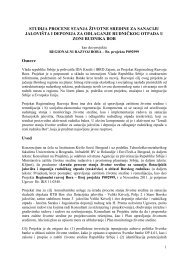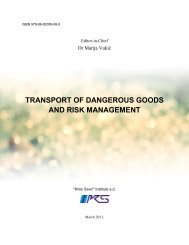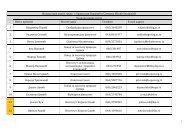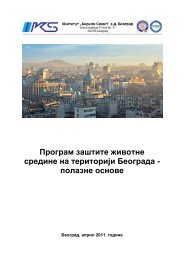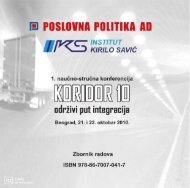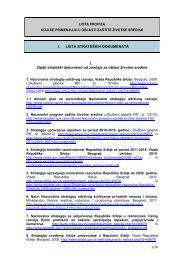- Page 1 and 2:
3rd International Scientific and Pr
- Page 3 and 4:
3rd International Scientific and Pr
- Page 5 and 6:
3rd International Scientific and Pr
- Page 7 and 8:
3rd International Scientific and Pr
- Page 9 and 10:
3rd International Scientific and Pr
- Page 11 and 12:
3rd International Scientific and Pr
- Page 13 and 14:
3rd International Scientific and Pr
- Page 15 and 16:
3rd International Scientific and Pr
- Page 17 and 18:
3rd International Scientific and Pr
- Page 19 and 20:
3rd International Scientific and Pr
- Page 21 and 22:
3rd International Scientific and Pr
- Page 23 and 24:
3rd International Scientific and Pr
- Page 25 and 26:
3rd International Scientific and Pr
- Page 27 and 28:
3rd International Scientific and Pr
- Page 29 and 30:
3rd International Scientific and Pr
- Page 31 and 32:
3rd International Scientific and Pr
- Page 33 and 34:
3rd International Scientific and Pr
- Page 35 and 36:
3rd International Scientific and Pr
- Page 37 and 38:
3rd International Scientific and Pr
- Page 39 and 40:
3rd International Scientific and Pr
- Page 41 and 42:
3rd International Scientific and Pr
- Page 43 and 44:
3rd International Scientific and Pr
- Page 45 and 46:
3rd International Scientific and Pr
- Page 47 and 48:
3rd International Scientific and Pr
- Page 49 and 50:
3rd International Scientific and Pr
- Page 51 and 52:
3rd International Scientific and Pr
- Page 53 and 54:
3rd International Scientific and Pr
- Page 55 and 56:
3rd International Scientific and Pr
- Page 57 and 58:
3rd International Scientific and Pr
- Page 59 and 60:
3rd International Scientific and Pr
- Page 61 and 62:
3rd International Scientific and Pr
- Page 63 and 64:
3rd International Scientific and Pr
- Page 65 and 66:
3rd International Scientific and Pr
- Page 67 and 68:
3rd International Scientific and Pr
- Page 69 and 70:
3rd International Scientific and Pr
- Page 71 and 72:
3rd International Scientific and Pr
- Page 73 and 74:
3rd International Scientific and Pr
- Page 75 and 76:
3rd International Scientific and Pr
- Page 77 and 78:
3rd International Scientific and Pr
- Page 79 and 80:
3rd International Scientific and Pr
- Page 81 and 82:
3rd International Scientific and Pr
- Page 83 and 84:
3rd International Scientific and Pr
- Page 85 and 86:
3rd International Scientific and Pr
- Page 87 and 88:
3rd International Scientific and Pr
- Page 89 and 90:
3rd International Scientific and Pr
- Page 91 and 92:
3rd International Scientific and Pr
- Page 93 and 94:
3rd International Scientific and Pr
- Page 95 and 96:
3rd International Scientific and Pr
- Page 97 and 98:
3rd International Scientific and Pr
- Page 99 and 100:
3rd International Scientific and Pr
- Page 101 and 102:
3rd International Scientific and Pr
- Page 103 and 104:
3rd International Scientific and Pr
- Page 105 and 106:
3rd International Scientific and Pr
- Page 107 and 108:
3rd International Scientific and Pr
- Page 109 and 110:
3rd International Scientific and Pr
- Page 111 and 112:
3rd International Scientific and Pr
- Page 113 and 114:
3rd International Scientific and Pr
- Page 115 and 116:
3rd International Scientific and Pr
- Page 117 and 118:
3rd International Scientific and Pr
- Page 119 and 120:
3rd International Scientific and Pr
- Page 121 and 122:
3rd International Scientific and Pr
- Page 123 and 124:
3rd International Scientific and Pr
- Page 125 and 126:
3rd International Scientific and Pr
- Page 127 and 128:
3rd International Scientific and Pr
- Page 129 and 130:
3rd International Scientific and Pr
- Page 131 and 132:
3rd International Scientific and Pr
- Page 133 and 134:
3rd International Scientific and Pr
- Page 135 and 136:
3rd International Scientific and Pr
- Page 137 and 138:
3rd International Scientific and Pr
- Page 139 and 140:
3rd International Scientific and Pr
- Page 141 and 142: 3rd International Scientific and Pr
- Page 143 and 144: 3rd International Scientific and Pr
- Page 145 and 146: 3rd International Scientific and Pr
- Page 147 and 148: 3rd International Scientific and Pr
- Page 149 and 150: 3rd International Scientific and Pr
- Page 151 and 152: 3rd International Scientific and Pr
- Page 153 and 154: 3rd International Scientific and Pr
- Page 155 and 156: 3rd International Scientific and Pr
- Page 157 and 158: 3rd International Scientific and Pr
- Page 159 and 160: 3rd International Scientific and Pr
- Page 161 and 162: 3rd International Scientific and Pr
- Page 163 and 164: 3rd International Scientific and Pr
- Page 165 and 166: 3rd International Scientific and Pr
- Page 167 and 168: 3rd International Scientific and Pr
- Page 169 and 170: 3rd International Scientific and Pr
- Page 171 and 172: 3rd International Scientific and Pr
- Page 173 and 174: 3rd International Scientific and Pr
- Page 175 and 176: 3rd International Scientific and Pr
- Page 177 and 178: 3rd International Scientific and Pr
- Page 179 and 180: 3rd International Scientific and Pr
- Page 181 and 182: 3rd International Scientific and Pr
- Page 183 and 184: 3rd International Scientific and Pr
- Page 185 and 186: 3rd International Scientific and Pr
- Page 187 and 188: 3rd International Scientific and Pr
- Page 189 and 190: 3rd International Scientific and Pr
- Page 191: 3rd International Scientific and Pr
- Page 195 and 196: 3rd International Scientific and Pr
- Page 197 and 198: 3rd International Scientific and Pr
- Page 199 and 200: 3rd International Scientific and Pr
- Page 201 and 202: 3rd International Scientific and Pr
- Page 203 and 204: 3rd International Scientific and Pr
- Page 205 and 206: 3rd International Scientific and Pr
- Page 207 and 208: 3rd International Scientific and Pr
- Page 209 and 210: 3rd International Scientific and Pr
- Page 211 and 212: 3rd International Scientific and Pr
- Page 213 and 214: 3rd International Scientific and Pr
- Page 215 and 216: 3rd International Scientific and Pr
- Page 217 and 218: 3rd International Scientific and Pr
- Page 219 and 220: 3rd International Scientific and Pr
- Page 221 and 222: 3rd International Scientific and Pr
- Page 223 and 224: 3rd International Scientific and Pr
- Page 225 and 226: 3rd International Scientific and Pr
- Page 227 and 228: 3rd International Scientific and Pr
- Page 229 and 230: 3rd International Scientific and Pr
- Page 231 and 232: 3rd International Scientific and Pr
- Page 233 and 234: 3rd International Scientific and Pr
- Page 235 and 236: 3rd International Scientific and Pr
- Page 237 and 238: 3rd International Scientific and Pr
- Page 239 and 240: 3rd International Scientific and Pr
- Page 241 and 242: 3rd International Scientific and Pr
- Page 243 and 244:
3rd International Scientific and Pr
- Page 245 and 246:
3rd International Scientific and Pr
- Page 247 and 248:
3rd International Scientific and Pr
- Page 249 and 250:
3rd International Scientific and Pr
- Page 251 and 252:
3rd International Scientific and Pr
- Page 253 and 254:
3rd International Scientific and Pr
- Page 255 and 256:
3rd International Scientific and Pr
- Page 257 and 258:
3rd International Scientific and Pr
- Page 259 and 260:
3rd International Scientific and Pr
- Page 261 and 262:
3rd International Scientific and Pr
- Page 263 and 264:
3rd International Scientific and Pr
- Page 265 and 266:
3rd International Scientific and Pr
- Page 267 and 268:
3rd International Scientific and Pr
- Page 269 and 270:
3rd International Scientific and Pr
- Page 271 and 272:
3rd International Scientific and Pr
- Page 273 and 274:
3rd International Scientific and Pr
- Page 275 and 276:
3rd International Scientific and Pr
- Page 277 and 278:
3rd International Scientific and Pr
- Page 279 and 280:
3rd International Scientific and Pr
- Page 281 and 282:
3rd International Scientific and Pr
- Page 283 and 284:
3rd International Scientific and Pr
- Page 285 and 286:
3rd International Scientific and Pr
- Page 287 and 288:
3rd International Scientific and Pr
- Page 289 and 290:
3rd International Scientific and Pr
- Page 291 and 292:
3rd International Scientific and Pr
- Page 293 and 294:
3rd International Scientific and Pr
- Page 295 and 296:
3rd International Scientific and Pr
- Page 297 and 298:
3rd International Scientific and Pr
- Page 299 and 300:
3rd International Scientific and Pr
- Page 301 and 302:
3rd International Scientific and Pr
- Page 303 and 304:
3rd International Scientific and Pr
- Page 305 and 306:
R [m] V [km/h] n n [mm] 3rd Interna
- Page 307 and 308:
QNx [%] QNx [%] 3rd International S
- Page 309 and 310:
3rd International Scientific and Pr
- Page 311 and 312:
3rd International Scientific and Pr
- Page 313 and 314:
3rd International Scientific and Pr
- Page 315 and 316:
3rd International Scientific and Pr
- Page 317 and 318:
3rd International Scientific and Pr
- Page 319 and 320:
3rd International Scientific and Pr
- Page 321 and 322:
3rd International Scientific and Pr
- Page 323 and 324:
3rd International Scientific and Pr
- Page 325:
3rd International Scientific and Pr


